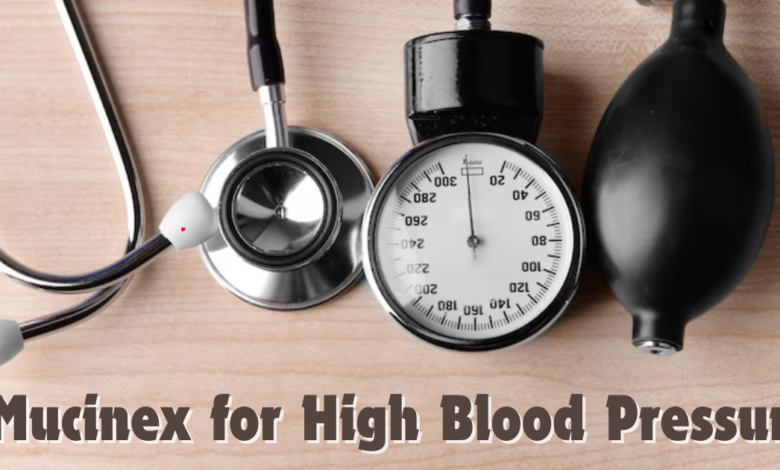Mucinex for High Blood Pressure: What You Need to Know

Understanding medicine can be hard, especially if you have health issues like high blood pressure. One medicine people ask about is Mucinex. It’s important to know how Mucinex works with high blood pressure to make sure it helps and doesn’t cause harm.
What is Mucinex?
Mucinex is an over-the-counter medicine that treats cough and chest congestion caused by the common cold, flu, or other respiratory infections. It contains guaifenesin, an active substance that loosens and thins mucus in the airways, making it simpler to cough and empty the chest.
Mucinex is available without a prescription in a variety of formulations, including tablets, liquids, and extended-release tablets, and may be purchased at most pharmacies and drug stores.

What Are The Uses of Mucinex?
Mucinex is generally used to alleviate symptoms of respiratory congestion, such as:
- Cough: Mucinex loosens and thins mucus in the airways, making it simpler to cough up.
- Chest Congestion: It helps to alleviate congestion in the chest by releasing mucus.
- Throat Clearing: Mucinex might help soothe throat irritation caused by excess mucus.
These applications are often linked to respiratory disorders such as the common cold, flu, bronchitis, and other respiratory infections.
Related: Can You Take Zyrtec and Mucinex Together?
How Mucinex Works?
Mucinex primarily functions through its primary ingredient, guaifenesin. Guaifenesin is an expectorant, which means it loosens and thins mucus in the airways, allowing it to be expelled more easily by coughing.
When you take Mucinex, guaifenesin increases the hydration of the mucus in your respiratory system. This hydration helps to break down the thick, sticky mucus, making it less viscous and easier to cough up. As a result, it aids in the relief of chest congestion and cough caused by respiratory disorders such as the common cold, flu, bronchitis, and other infections.
Can Mucinex Affect Blood Pressure?
Mucinex, which contains the active component guaifenesin, is generally used as an expectorant to loosen mucus in the chest. Mucinex itself does not usually cause high blood pressure.
However, certain Mucinex formulations contain additional active substances, such as pseudoephedrine or phenylephrine, which are decongestants. These decongestants may increase blood pressure. It is critical to study the label and discover the precise ingredients in any Mucinex product you are taking.

Which Cough and Cold Medications Increase Blood Pressure?
Certain cough and cold drugs may raise blood pressure due to their components. The following are some common components present in various drugs that may alter blood pressure:
- Decongestants: They are commonly present in nasal decongestant sprays and oral treatments. Ingredients such as pseudoephedrine and phenylephrine can cause blood vessels to constrict, resulting in an increase in blood pressure.
- NSAIDs (Nonsteroidal Anti-Inflammatory Drugs): Some cold treatments contain NSAIDs, such as ibuprofen or naproxen, which ease discomfort and fever. These medications can cause fluid retention and raise blood pressure, particularly in people who have pre-existing hypertension.
- Caffeine: Certain cold drugs, particularly those intended for daytime use or promoted as “extra strength,” may contain caffeine to increase alertness. Caffeine can temporarily raise blood pressure in certain people.
- Antihistamines: Although antihistamines are generally regarded safe for most people, they can produce a modest elevation in blood pressure in certain people, particularly elderly persons.
What Are The Side Effects of Mucinex?
Mucinex, which includes the active component guaifenesin, is often used to reduce chest congestion and improve cough productivity by thinning mucus in the airways. While most people tolerate it well, it, like any other medication, might have negative effects in some. Mucinex may have the following common side effects:
- Nausea: After taking Mucinex, some people may feel queasy or have an upset stomach.
- Vomiting: In some situations, Mucinex can cause vomiting, especially if it causes severe stomach distress.
- Dizziness: Some people may experience lightheadedness or dizziness when taking the medicine, particularly when they first start.
- Headache: Mucinex may occasionally produce headaches as a side effect.
- Drowsiness: Although less common, some people may experience drowsiness or weariness after taking Mucinex, particularly if they are sensitive to its effects.
- Allergic reactions: Although rare, some people may have allergic responses to guaifenesin, which include rash, itching, swelling, dizziness, and difficulty breathing. If you suspect you are having an allergic reaction, seek medical attention right once.
Other possible adverse effects include dry mouth, rash, hives, itching, and difficulty breathing. If you encounter any unusual or severe adverse effects while taking Mucinex, contact your doctor right away.

Conclusion
To make sure Mucinex doesn’t cause problems if you have high blood pressure, it’s important to know how they work together. Ask your doctor before using it, read the instructions, and choose types that don’t have certain ingredients. Doing these things helps you treat your symptoms without hurting yourself.
People Also Ask
1. Can I take Mucinex if I have high blood pressure?
Yes, you can take Mucinex if you have high blood pressure, but be cautious. When you have a cold or cough, Mucinex helps clear the mucus from your lungs. However, certain Mucinex products contain chemicals that may be unsafe for those with high blood pressure. It is best to see your doctor or pharmacist to ensure if it is appropriate for you.
2. Does Mucinex raise blood pressure?
Most Mucinex products do not cause high blood pressure. However, certain Mucinex medicines contain decongestants such as pseudoephedrine or phenylephrine, which might cause your blood pressure to increase. Always read the label and consult your doctor before taking any new medication, especially if you have high blood pressure.
3. What are the safe Mucinex options for people with high blood pressure?
If you have high blood pressure, search for Mucinex products that are decongestant-free. These are often branded simply “Mucinex” without additional adjectives such as “D” or “DM.” Again, consult your doctor or pharmacist to ensure you choose the correct one.
4. Can I take Mucinex DM if I have high blood pressure?
Mucinex DM contains dextromethorphan (to relieve coughing) and guaifenesin (to help remove mucus). It does not contain decongestants, making it generally safer for persons with high blood pressure. Still, you should always consult your doctor first to ensure that it’s safe for you to consume.
5. What should I do if Mucinex affects my blood pressure?
If you realize that your blood pressure has increased after taking Mucinex, stop taking it and contact your doctor immediately. Your doctor can help you locate a safer alternative while also ensuring your health. Always follow your doctor’s recommendations when taking any medication, especially if you have a condition such as high blood pressure.




